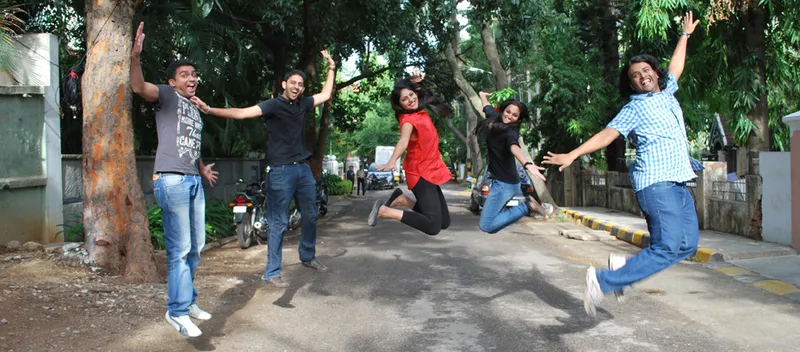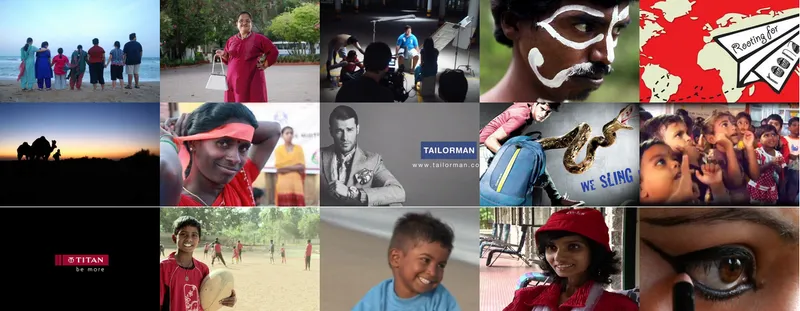Curley Street Media: Making more than just a film

Pavitra Chalam spent many years as a child growing up in Curley Street, Bangalore. The street is ‘inextricably linked with her past and present.’ You could say the true beginnings of Curley Street Media (CSM) started with this deep connection to Curley Street and Chalam’s love for storytelling. Chalam went on to study at the New York Film Academy.
The beginnings of her film-making career began with Bus. Part of the Youth Initiative for Peace in Pakistan, Bus was a glimpse into the likeness of the narratives of the youth in Pakistan and India. 2005 brought Chalam closer to her humanitarian goals as a filmmaker for the Peace Child International in Europe.
It was in 2012 that the foundation stones of CSM were set, with a diverse, opinionated group of young souls whose primary qualification was to possess a madness to bring the small, but important, narratives of the country to the mainstream. CSM credits the commixture of the anarchist-conformist, realist-optimist energies in their workforce with ‘driving them in their creative pursuits.’
Since its inception, CSM has documented 50 stories of social import and justice.
But, the business of film-making is, first and foremost, a business of film-making, and it comes with the toils and troubles of creation.
‘More often than not we work on tight a budget, which means that we have to follow a brutal schedule and work with what is available. At the same time we need to ensure that our standards of aesthetic and attention to detail are not compromised.
‘Each film is a creative exercise irrespective of the genre. It is sad that documentaries and films based on social issues often have poor reach simply because aesthetics gets sidelined by content.
‘There are so many incredible true stories to be told. As long as these issues get out there and touch people, we know that we are affecting true and powerful change.’
When social justice and film-making come together, the harshest critical commentary a film can receive is one label mercilessly dropped like a neutron bomb: emotional porn. The accusation is destructive, and invalidates the entire content of a film, as genuine as the issues it deals with might be.
With the power to render the human condition with their own spotlights, sometimes, artistic licenses are taken too far, and we’re left with an almost farcically sentimental representation of real human pain.
That fine balance between art and farce is what defines a good documentary filmmaker.
‘We are telling the stories of people’s lives, their reality and cannot afford to fall short when our camera is the window to the truth.
‘Yes, it is true that often there is a lot of raw emotion involved in the way our stories unfold, but it is up to us to make sure that while the audience feels the weight of that emotion, it is not glorified or exploited in any manner. It is simple, powerful and yet very real.’
With all the raw emotions and lugubrious stories, there’s a baggage involved in filming the stories you need to force the world to listen to. So, is the filmmaker a person who must build a wall to protect himself from the tragic realm within which he works with surgical precision and robotic stoicism? Or, is the filmmaker a method actor who immerses in his stories?
‘We always get deeply involved with the stories that we are presenting, not only as filmmakers but as individuals. While it is heart-wrenching to witness the harsh realities and the painful struggles often associated with the kind of stories we cover, it is our responsibility to see the resilience and the bravery in those struggles, and the smiles that break through the pain, and help others see the same.

One of the most interesting and heart-rending stories covered by CSM is of baby Roona’s, the story of a child with hydrocephalus, a disorder identified by the abnormal accumulation of cerebrospinal fluid in the brain. Though, hers is a story with triumph and hope, not every story lends itself to a picture-perfect ending. CSM’s other documentary Indelible dealt with Down syndrome in India, and the journey it took them through had something else in store.
‘As we got to know Roona and her parents and started investigating the root of her condition, we became emotionally invested in her story and the unheard stories of thousands of children like her.
‘We are in constant touch with Roona’s family and each step she takes towards recovery, we take with them.
‘We stay in touch with all the people who let us into their lives and let us take their stories to the world. They instantly become an integral part of the CurleyStreet family.
‘Indelible was supposed to be a story about 8 amazing people. Right in the midst of production, one of them passed away. She was struggling with many complications and succumbed to them as a result of the lack of proper healthcare. It was a massive blow to everyone. At times like that, you keep the larger goal in focus so that people like her do not lose their lives to something that can be easily prevented.’
A story very personal to her, Chalam adds, ‘7 years ago I met Aysha, a cancer patient fighting for her life. The doctors had given her a few weeks to live. At this point, she was 30 kilos and could hardly move but I have never seen anyone so excited to be in front of the camera, talking about all the good things in her life. The line from this film that stays with me everyday is when she says, ‘If I can inspire at least one single patient then I have lived my life.
‘We managed to take the film to her a few hours before she passed away. We called the film Aysha-The Eternal One. The film went on to inspire families battling with cancer across the country. There is no way to describe an experience like this. It gave me the faith to continue to do what I do and to continue to bring these amazing people and stories to the world.’
It’s not new to let the glow of the silver screen burn the world-weary soul’s cynicism and fatalism.
We see that escapism in India today.
In times where the accents and relationships of Bollywood stars receive far more national deliberation than the struggles of our neighbours, social documentaries exist to give canvas to a part of the world that still exists in morose shades of grey, and India is a land where that grey is overpowering, abundant, ubiquitous, but ignored.
‘There is a definite lack of awareness and affirmative action when it comes to addressing the needs of people with complex needs, or the problems of those living on the fringes of society in India. The picture is slowly changing with more people working towards initiating movements that address these issues. Our vision is to bring this change to life through the power of film.’
‘The number of feature length documentaries produced in India is miniscule when compared to the West. It is a challenging medium to work with, and local audience appetite is still paltry, so exhibition platforms are scarce. The brave few that persevere are scattered across the country.
‘Short documentaries typically have a faster narrative style that makes them more palatable for audiences since the experience is closer to commercial cinema. Also, from a distribution point of view, short documentaries can be packaged for platforms like television more easily.
‘Having said this, there are some beautiful films being made, as the advent of digital filmmaking has made the medium more accessible.’
This difficulty of documentary filmmaking was never more evident for CSM than when shooting Rooting for Roona, which also highlighted (for CSM) the need to go beyond just documenting lives.
‘The production had been challenging from the get go. When we set out to make this film, there were a few of the things we had to keep in mind:
‘First, the lead subject was frail and the situation unprecedented. No one, including her doctors, knew how her condition would evolve. Second, the subject of healthcare and birth defects is vast, complicated and multi-dimensional (and we were all students of the liberal arts!). To top it all, we had no production funding whatsoever.
‘Today, we are midway through principal photography and are aiming to wrap post-production early next year. We successfully completed India’s largest crowd-funding campaign for a non-fiction film on Indiegogo. We have tied up with faculty from the Pune University to help guide us through our research. Finally, earlier this year, Rooting for Roona was 1 of 6 films chosen for India’s first GoodPitch event held in Mumbai. We hope that this film will be the definitive starting point in our war against birth defects.’

CSM also dabbles in commercial work. The demands are different, the skills required different, and it brings in a welcome change to what they do, besides being financially rewarding, a fact they admit. Whilst technical experimentation is minimal with their documentaries, shooting web and ad films gives them more opportunity to test cinematic techniques.
So, what does CSM hold for the future?
‘We are also just entering the public service announcement/advertising space with a campaign for blood donation that we’re all excited about. Our immediate focus in the non-fiction space is to become pioneers in creating social change through planned outreach campaigns and audience engagement strategies in India. We want to prove with data that films can actually change the world.
‘We have been involved with some web videos and promotional videos for Start-Ups, and find it very exciting to work with entrepreneurs. Our energy levels, passion and drive are very similar.
‘Our vision is to reach a stage where CurleyStreet becomes a name equally associated with creating the best ad films in the country, as well as the most impactful social justice films.’
Our Website: www.curleystreet.co.in
We would love to hear from you! Please share your ideas, opinions, stories and any queries with us at: [email protected]







